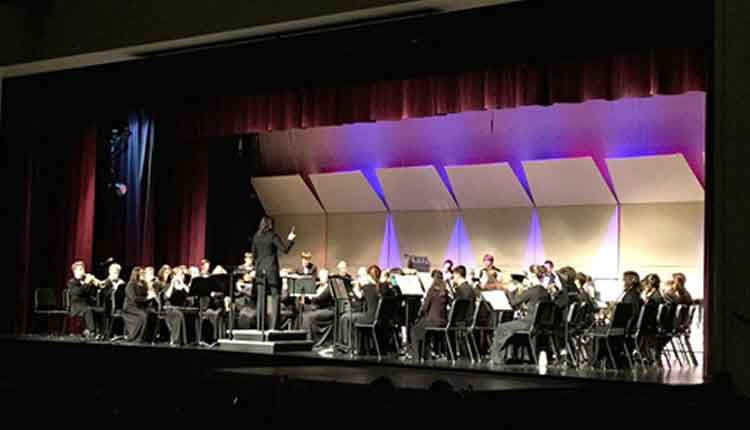Your band will benefit all year long from a thoughtful choice of repertoire
There is no substitute for being prepared. For the band or orchestra director, one of the first steps in getting ready for the new school year is choosing the repertoire, which provides a firm foundation for the next nine months. But selecting the right music from the vast array promoted by publishers is a task not to be taken lightly.
Select the repertoire for all of your ensembles before school starts, and be prepared before you take the podium. Don’t wait until marching season is over before giving serious attention to concert repertoire, and don’t put off selecting jazz band music until the first performance is in sight. First impressions are powerful. If you arrive at the first rehearsal totally prepared and enthusiastic, students will share that enthusiasm; if they sense you’re winging it, you probably can’t expect much better from them.
So how do you choose quality literature that is right for your ensembles? Browsing publishers’ catalogs is an obvious place to start. New works and new editions of established pieces appear all the time, and publishers are not shy about getting the word out. Promotional CDs that often accompany music catalogs provide an excellent way to become familiar with the available literature. Additionally, many college ensembles regularly make recordings that are easily obtained.
An even better approach is to attend as many performances at other schools as possible. Programs should be saved and filed, along with your written comments regarding particular pieces. Look up the pieces to find their intended grade level. If possible, obtain and familiarize yourself with the score. In this way, an ongoing and expanding repertoire list can be established that will be helpful in years to come. Plan for the future — a piece that may not be suitable for your present ensemble might work perfectly next year.
The beginning director, however, needs to act quickly. Start by going to the website for the music educators’ association in your state and checking the repertoire list. Then search your library and see which pieces are appropriate for the grade level of your group. Before purchasing new music, it is best to ask someone for recommendations. Many experienced directors are ready and willing to share their knowledge.
Additionally, most college band and orchestra directors will be glad to offer assistance. Recruiting is a major part of their job, and they generally welcome the opportunity to work with high school directors. The field of music education tends to be a cooperative learning community where all share a common goal. Free and unbiased expert advice can be just a phone call away.
The primary consideration in selecting repertoire must be its educational value. As with all educational material, the task assigned to students must be sufficiently challenging without exceeding their current skill level. Learning music should be a process of building musical skills. Pieces should be of artistic merit, deepening students’ appreciation for artistic excellence and expanding their understanding of various musical styles and historic periods.
While educating students is the primary goal in selecting and learning repertoire, preparing for concert performances is a significant objective in carrying out that goal. Factors such as student enthusiasm and audience appeal cannot be overlooked. This is where music differs from strictly academic classes. Concerts, festivals, and competitions are significant events that enable students to work together for a common goal. The right literature is essential if this collective experience is to go well.
While directors should choose music that realistically matches the appropriate grade level of the ensemble, it is also wise to test the limits of that grade level. Certainly, students should have at least one piece that pushes them beyond their comfort zone. Such pieces might even be programmed for concerts, so long as they are chosen wisely. A piece that is just a bit “too hard” might come off nicely if it features a lot of tutti texture where weaknesses are somewhat camouflaged. Alternatively, pieces might be chosen that feature individual sections or soloists that happen to represent a particularly strong area in your group.
It is also a good idea to choose some pieces at a lower grade level than the students are capable of. This helps make the point that not all hard music is good music and not all easy music is insignificant; often, it is just the opposite. It is sometimes said that Mozart wrote music everyone can play but no one can play correctly. His compositions display such clarity and perfection that even the smallest performance flaws are highly exposed. Playing easier pieces can allow your students to work on musical nuances and expression. This, in turn, can help students build confidence and poise when performing.
Concert programs should include many types of music at various levels of difficulty. Not only does this variety offer a broader learning experience for the students, but it also helps retain audience attention. Concerts should be planned with logic and consistency; the audience shouldn’t feel the program has been thrown together helter-skelter. One effective plan is to program lighter music toward the beginning with the heavier pieces later (but not last) in the program.
One difficulty to be addressed in music selection is keeping variety in the repertoire by not repeating music from previous seasons while at the same time recognizing there are some pieces that all high school music students should experience. Having played Gustav Holst’s First Suite in Eb and Ralph Vaughan Williams’ English Folk Song Suite in high school band, I still recall how the director stressed the importance of these pieces in the literature. Surely every student deserves the opportunity to perform works of this stature.
Fortunately, the literature is so rich in “classics” that a little substitution can avoid repeating specific compositions every three or four years. For example, it would be wise to include any piece by Percy Grainger or Ralph Vaughan Williams on a regular basis, as well as some of the many Bach transcriptions that are available.
Choosing music for festivals and competitions involves special consideration. Care must be taken not to program pieces that are too difficult. Aside from the obvious concern that adjudicators will be listening for any signs of faulty execution, too much rehearsal time will be spent on meeting the technical demands of the music, with too little time left for expressive and musical concerns.
Familiar repertoire should also be avoided. Adjudicators tend to know these pieces very well, and they have their own opinions about how they should be played. It would be unfortunate to receive a low rating on a flawless performance simply because an adjudicator was unhappy with the director’s interpretation of the work. This can be avoided by programming recent works that are less well known.
An exciting phenomenon in the band is the rapid rise in the quantity and quality of compositions being written for band over the past few years. A number of prominent composers have recently turned their attention to this field, and the results are spectacular. Only last year, a band composition was nominated for the Pulitzer Prize in music. Excellent new works are appearing regularly.
This trend is of extreme importance in recruiting students and maintaining enthusiasm. Not too many years ago, high school ensembles tended to play music that fell into one of three categories: (1) traditional literature that was composed many years in the past, (2) pop music arrangements from Broadway shows associated with a previous generation or (3) watered-down versions of rock music that offered an embarrassing imitation of the real thing.
That is no longer the case. It is entirely possible for today’s high school ensembles to find themselves playing music that is newer than what they are accustomed to hearing on the radio.
This resurgence in new composition is being supported by efforts within the music education establishment. The BandQuest initiative of the American Composers Forum, for instance, recently commissioned compositions suitable for middle school (levels two or three) from ten of the leading composers writing today.
Similar efforts are occurring throughout the country. Some school music programs have commissioned works written specifically for their own ensembles, sometimes working and rehearsing with the composer in preparation for performance.
Although few programs have budgets that allow commissioning their own works, all can benefit from the tremendous boom in composition that is now taking place.
The challenge today is not “How can I find some good music for my students?” but rather “How can I choose from the tremendous quantity of great music that is out there?” It is a delightful dilemma with which we are now faced.
Robert Rawlins is chairman of the music department at Rowan University in Glassboro, New Jersey. His publishing credits include Jazzology: The Encyclopedia of Jazz Theory for All Musicians, a new release from Hal Leonard that he coauthored.


